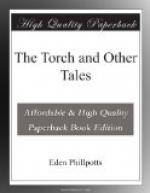So she bided a spinster woman, and took very kindly to my childer, who would run up over to her when they could, for they loved her. And by the same token, my second daughter, by the name of Daisy, was drowned in Dart, poor little maid, trying to go up to her aunt. My wife had whipped her for naughtiness, and the child—only ten she was—went off to get comfort from Mary and fell in the river with none to save her. So I’ve paid my toll to Dart, you see, like many another man in these parts.
Well, my sister, same as a good many other terrible ugly women, got better to look at as she grew older; and after she was sixty, her hair turned white and she filled out a bit. Her voice was always a pleasant thing about her. It reflected her nature, which was kindly, though excitable. But her people never left her. She’d got a hind and his wife—Noah and Jane Sweet by name; and he was head man; and his son, Shem Sweet, came next—thirty year old he was; and besides them was Nelly Pearn, dairymaid, and two other men and a boy.
Then came along the Old Soldier to Little Sherberton; and he never left it again till five year ago, when he went out feet first.
To this day I couldn’t tell you much about him. His character defied me. I don’t know whether he was good, or bad, or just neither, like most of us. But on the whole I should be inclined to say he was good. He was cast in a lofty mould, and had a wide experience of the seamy side of life. I proved him a liar here and there, and he proved me a fool, but neither of us shamed the other in that matter, for I said (and still say) that I’d sooner be a fool then a rascal; while he, though he denied being a rascal, said that he’d sooner be the biggest knave on earth than a fool. He argued that any self-respecting creature ought to feel the same, and he had an opinion to which he always held very stoutly, that the fools made far more trouble in the world than the knaves. He went further than that, and said if there were no fools, there wouldn’t be no knaves. But there I didn’t hold with him; for a man be born a fool by the will of God, and I never can see ’tis anything to be shamed about; whereas no man need be a knave, if he goes to the Lord and Father of us all in a proper spirit, and prays for grace to withstand the temptations of the world, the flesh, and the Dowl.
Bob Battle he called himself, and he knocked at the door of Little Sherberton on a winter night, and asked to see Mary, and would not be put off by any less person. So she saw him, and heard how he had been tramping through Holne and stopped for a drink and sang a song to the people in the bar. It happened that Mr. Churchward, the innkeeper, wanted a message took to my sister about some geese, and none would go for fear of snow, so the tramp, for Bob was no better, said that he would go, if they’d put him in the way and give him a shilling. And Churchward trusted him, because he said that he reminded him of his dead brother. Though that wasn’t nothing in his favour, seeing what Henry Churchward had been in life.




